
Econometrics
metrics 2024
Empowering Economists with Open Access Insights
Introduction
Econometrics, published by MDPI, is a prominent open access journal based in Switzerland, dedicated to advancing research in the fields of economics and econometrics. Since its inception in 2013, this journal has been pivotal in disseminating innovative theories and empirical findings, fostering an engaging dialogue among scholars and practitioners. With an impressive Q2 ranking in the 2023 category of Economics and Econometrics and a solid position at #378 out of 716 in Scopus rankings, it stands as a vital resource for those seeking to enhance their understanding and application of econometric methods. The journal offers immediate open access to its published articles, ensuring that researchers, professionals, and students alike can easily access and contribute to the evolving body of knowledge in this essential discipline. The scope of Econometrics encourages submissions that cover a broad array of topics, making it a dynamic platform for innovative research until 2024 and beyond.
Metrics 2024
 -
- 1.10
1.10 1.40
1.40 -
-Metrics History
Rank 2024
IF (Web Of Science)
JCI (Web Of Science)
Quartile History
Similar Journals
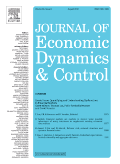
JOURNAL OF ECONOMIC DYNAMICS & CONTROL
Advancing the Frontiers of Economic Dynamics and ControlJOURNAL OF ECONOMIC DYNAMICS & CONTROL, published by Elsevier, is a distinguished scholarly journal that has established itself as a leading outlet in the fields of applied mathematics, control and optimization, and economics and econometrics since its inception in 1979. With its notable Q1 categorization in 2023 across these disciplines, this journal provides a platform for innovative research that propels theory and practice in dynamic systems and control processes. Researchers, professionals, and students can engage with cutting-edge studies that explore complex economic models and their real-world applications. Although the journal does not offer open access, it remains a vital resource for those aiming to stay informed of the latest advancements in economic dynamics and control methodologies. The journal’s commitment to high-quality research and its impressive standing—ranked in the top percentiles within Scopus categories—underscore its importance and influence within the academic community.

International Advances in Economic Research
Fostering Academic Excellence in Economic ResearchInternational Advances in Economic Research, published by SPRINGER, stands as a significant resource within the field of economics and econometrics, consistently contributing to the theoretical and empirical understanding of economic phenomena since its inception in 1995. With an ISSN of 1083-0898 and E-ISSN of 1573-966X, this journal is dedicated to advancing economic research through a rigorous peer-review process and disseminating high-quality scholarly articles. The journal's esteemed classification places it in the third quartile (Q3) within the Economics and Econometrics category for 2023, indicating its respectable standing in academic circles. It serves as an important conduit for the dissemination of innovative economic theories, data analysis, and policy discussions, appealing to researchers, professionals, and students alike. Though not an open-access journal, it provides valuable subscription-based content that enriches the understanding of diverse economic issues and fosters a community of inquiry among academics. With its projected outlook extending to 2024, International Advances in Economic Research continues to be an essential platform for scholars aiming to influence and engage with contemporary economic debates.

Computational Economics
Empowering Economists with Cutting-Edge Computational Research.Computational Economics is a premier journal dedicated to advancing the interdisciplinary field that bridges computational methods and economic theory. Published by Springer in the Netherlands, this journal serves as a critical platform for researchers and practitioners from economics, econometrics, and computer science, fostering innovation and cross-pollination of ideas from 1993 to 2024. With a notable impact factor in its categories—ranking Q2 in Economics, Econometrics, and Finance and Q3 in Computer Science Applications—Computational Economics consistently delivers rigorous peer-reviewed research that addresses contemporary challenges in economic modeling and computational techniques, making it an indispensable resource for the academic community. The journal provides a range of access options and is indexed in Scopus, where it holds a strong position in the 78th percentile of its category, ensuring high visibility and engagement for published works. Researchers, students, and professionals will find valuable insights across its diverse scope, facilitating the exploration of new methodologies that shape the future of economic analysis.
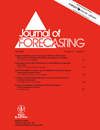
JOURNAL OF FORECASTING
Connecting theory and practice in forecasting excellence.JOURNAL OF FORECASTING, published by Wiley, stands as a vital resource in the fields of forecasting and predictive analytics, dedicated to advancing theoretical and practical knowledge. With a rich history dating back to its inception in 1982, the journal covers an extensive range of disciplines, evidenced by its impressive standing across several Scopus rankings, including Q1 in Modeling and Simulation and Q2 in Economics, Management Science, and Statistics among others. The journal holds an esteemed impact factor, indicative of its rigorous peer-review process and the significance of its contributions, making it essential reading for researchers, practitioners, and students alike. While the journal is not open access, it offers various subscription options to ensure that its valuable content is accessible to a wider audience. As it converges towards its 2024 milestone, the JOURNAL OF FORECASTING continues to forge paths in methodological advancements and empirical applications, reinforcing its reputation as a foremost publication in predictive modeling.
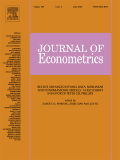
Journal of Econometrics
Unveiling the Complexities of Economic Data Analysis.Journal of Econometrics, published by ELSEVIER SCIENCE SA, is a leading journal in the fields of applied mathematics and econometrics, with a commendable reputation established since its inception in 1973. The journal's ISSN 0304-4076 and E-ISSN 1872-6895, reflect its commitment to quality research output, and it enjoys a high impact factor, ranking in the Q1 category for economics and applied mathematics as per the latest 2023 assessments. The journal aims to provide rigorous theoretical developments, empirical analyses, and methodologies in the rapidly evolving discipline of econometrics, thus catering to a diverse audience of researchers, professionals, and students alike. While currently not offered in an open access format, the quality and depth of research articles published within its pages make it a vital resource for anyone interested in the quantitative analysis of economic data. With a strong ranking in Scopus, particularly in the 96th percentile for applied mathematics, Journal of Econometrics continues to be at the forefront of academic inquiry, fostering advancements in both theory and practice within the global economy.

Ekonomika i Matematiceskie Metody-Economics and Mathematical Methods
Navigating the Intersection of Economics and MathematicsEkonomika i Matematiceskie Metody - Economics and Mathematical Methods is a distinguished journal published by the esteemed Russian Academy of Sciences and the State Academy of Humanities (GAUGN). It serves as a vital resource in the interdisciplinary field of economics and mathematical applications, focusing on advanced theories, methodologies, and quantitative techniques that drive economic research and practice. With an ISSN of 0424-7388, this journal is geared towards researchers, professionals, and students who seek to contribute to the evolving landscape of economic theory and mathematics. Although the journal does not currently offer open access, it remains committed to fostering rigorous academic discourse. Through its insightful articles, Ekonomika i Matematiceskie Metody plays a crucial role in disseminating influential concepts and methodologies, making it an essential publication within the realm of economic sciences.
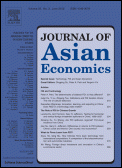
Journal of Asian Economics
Navigating the Complexities of Asian Financial MarketsThe Journal of Asian Economics, published by Elsevier, serves as a pivotal platform for scholars and practitioners engaged in the comprehensive study of economic issues within Asia. With an ISSN of 1049-0078 and an E-ISSN of 1873-7927, this esteemed journal encompasses a wide array of topics in its scope, ranging from macroeconomic policy analysis to the intricacies of financial markets in the Asian context. Ranking in the Q2 category for both Economics and Econometrics and Finance, according to the 2023 metrics, it is positioned among the top-tier journals, currently holding a significant place at the 73rd percentile in Finance and 72nd percentile in Economics. This journal not only caters to academic researchers looking to publish their findings but also serves as an essential resource for professionals and students seeking to deepen their understanding of the dynamic economic landscape in Asia. By bridging empirical research and practical insights, the Journal of Asian Economics plays a crucial role in advancing knowledge and encouraging discourse in the field.
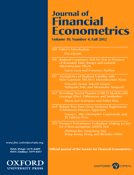
Journal of Financial Econometrics
Exploring the nexus of finance and econometrics.Journal of Financial Econometrics, published by Oxford University Press, stands as a leading academic journal in the fields of financial economics and econometrics. With an impressive impact factor and a ranking in the Q1 quartile for both Economics and Finance categories in 2023, this journal is recognized for its contribution to advancing theoretical and applied methodologies in financial econometric analysis. It publishes high-quality research that addresses critical issues in finance, aiming to foster a deeper understanding of the economic factors influencing financial markets and instruments. Researchers and practitioners alike benefit from its rigorous peer-reviewed articles, which are invaluable resources for both academic scholars and finance professionals. The journal’s content typically spans pioneering techniques in econometric modeling, empirical analysis of financial instruments, and innovative applications of econometric theory in real-world scenarios. Operating out of the United Kingdom, the journal continues to serve as a vital platform for disseminating significant research findings from 2005 to 2024, ensuring that the latest advancements in the field are accessible to its audience.
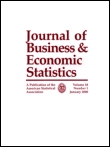
JOURNAL OF BUSINESS & ECONOMIC STATISTICS
Connecting Researchers to the Heart of Economic StatisticsJOURNAL OF BUSINESS & ECONOMIC STATISTICS is a premier academic journal published by Taylor & Francis Inc, dedicated to disseminating high-quality research in the fields of business, economics, and statistics. With an impressive impact in the academic community, the journal maintains a distinguished Q1 ranking across various categories including Economics and Econometrics, Social Sciences (miscellaneous), and Statistics and Probability, showcasing its relevance and influence in contemporary research. Since its inception in 1983, the journal has served as a vital resource for researchers, professionals, and students seeking insights into quantitative methodologies and their application in the economic domain. While the journal is not currently open access, its rigorous peer-review process ensures that published articles are of the highest scholarly standards. Researchers and practitioners alike will find a rich repository of empirical and theoretical studies that foster knowledge advancement in the intersecting realms of business, economics, and statistical analysis.

Central European Journal of Economic Modelling and Econometrics
Unlocking the potential of data-driven economic solutions.Central European Journal of Economic Modelling and Econometrics (ISSN: 2080-0886, E-ISSN: 2080-119X) is a premier academic publication housed under the auspices of the Polish Academy of Sciences - Lodz Branch. Since its establishment, this journal has served as a crucial platform for scholars and practitioners alike, focusing on the dynamic realms of economic modeling and econometrics. The journal is dedicated to advancing the understanding of economic systems and statistical methodologies, striving to bridge theoretical approaches with practical applications. Although currently categorized in the Q4 quartile across various fields such as Applied Mathematics, Economics, and Statistics, its commitment to rigorous research and scholarly discourse ensures it remains an important resource for academics looking to contribute insights in these sectors. Published in Poland and featuring articles aimed at enhancing the body of knowledge in econometric modeling, this journal embraces an open-access model, allowing for greater dissemination of research findings to a global audience. Researchers, professionals, and students will find valuable contributions that not only highlight emerging trends but also foster innovation in the field of economic sciences.